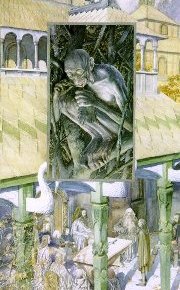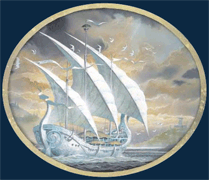Tolkien Calendar: The Great Years
Showing Single Newsitem
October 25, TA 3018
25 October 2005 17:26:28Categories: Tolkien Calendar
The Council of Elrond: Decisions and Implications

Shippey (in the appendix to "The Fellowship of the Ring" movie) compares the Council of Elrond to a badly chaired committee meeting and critics claim that this chapter in LOTR breaks all the rules of good writing, the first of which seems to be "Don't write thirty-two pages of straight dialogue!" But not only are crucial decisions made at the Council of Elrond, but they are made by the only people who could make them, and the implications of these decisions are world-saving.
For I think Elrond and Gandalf knew before the Council that the Ring had to be destroyed in the fires of Mount Orodruin, and they knew that Frodo had to be the Ringbearer. Strictly speaking, being a good portion of what was left of The White Council, Elrond and Gandalf had the authority to issue an order to this effect, and they would probably have been obeyed. But this mission was different: those who pursued it could very well give their lives for it, and that should be done only with full understanding and free will. So the Council had two purposes: education and consensus.
First, everything that was known about the Sauron and the Rings of Power had to be told to all. (elizabeth's admirable Calendar post last week brought us up to speed on that!) Secondly, the options are considered: Hide it. Use it. Throw it in the sea. Send it to Valinor. The members of the Council use all of their wisdom to consider what is to be done. Finally, this wisdom is based on their own understanding of what their purpose and duty are as citizens of Middle-earth in the Third Age. They understand that the Valar view them as children no longer, and so they must deal with the Ring themselves. They know that Sauron is eternally relentless, and so the solution must be permanent, if at all possible. And they know that in a contest of strength, Sauron will win; and so their victory can only come through unexpected ways.
It is a desperate gamble, based on all the wisdom they have, carried out in complete hope for Middle-earth and little hope for themselves. Of the Nine Walkers, probably only Sam, Merry, and Pippin expect to return, because they don't know any better. The implications? The Fellowship makes itself the opposite of Sauron: selfless, powerless, small, reliant on others, and hidden.
It is a desperate gamble and it all comes down to this:
Quote:
'Thus we return once more to the destroying of the Ring,' said Erestor, 'and yet we come no nearer. What strength have we for the finding of the Fire in which it was made? That is the path of despair. Of folly I would say, if the long wisdom of Elrond did not forbid me.'
'Despair, or folly?' said Gandalf. 'It is not despair, for despair is only for those who see the end beyond all doubt. We do not. It is wisdom to recognize necessity, when all other courses have been weighed, though as folly it may appear to those who cling to false hope. Well, let folly be our cloak, a veil before the eyes of the Enemy! For he is very wise, and weighs all things to a nicety in the scales of his malice. But the only measure that he knows is desire, desire for power; and so he judges all hearts. Into his heart thought will not enter that any will refuse it, that having the Ring we may seek to destroy it. If we seek this, we shall put him out of reckoning.'
'At least for a while,' said Elrond. 'The road must be trod, but it will be very hard. And neither strength nor wisdom will carry us far upon it. This quest may be attempted by the weak with as much hope as the strong. Yet such is oft the course of deeds that move the wheels of the world: small hands do them because they must, while the eyes of the great are elsewhere.'
. . .
'I will take the Ring . . . though I do not know the way.'
'Despair, or folly?' said Gandalf. 'It is not despair, for despair is only for those who see the end beyond all doubt. We do not. It is wisdom to recognize necessity, when all other courses have been weighed, though as folly it may appear to those who cling to false hope. Well, let folly be our cloak, a veil before the eyes of the Enemy! For he is very wise, and weighs all things to a nicety in the scales of his malice. But the only measure that he knows is desire, desire for power; and so he judges all hearts. Into his heart thought will not enter that any will refuse it, that having the Ring we may seek to destroy it. If we seek this, we shall put him out of reckoning.'
'At least for a while,' said Elrond. 'The road must be trod, but it will be very hard. And neither strength nor wisdom will carry us far upon it. This quest may be attempted by the weak with as much hope as the strong. Yet such is oft the course of deeds that move the wheels of the world: small hands do them because they must, while the eyes of the great are elsewhere.'
. . .
'I will take the Ring . . . though I do not know the way.'
Calendar entry by Merry
Artwork: "The Councilof Elrond" by Alan Lee
Artwork: "The Councilof Elrond" by Alan Lee
